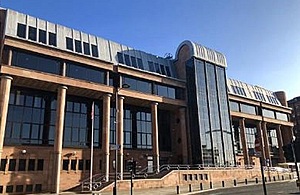UK science and the fight against COVID-19
The UK’s world-class science, research and innovation institutions are working around the clock to understand and tackle the COVID-19 pandemic – both domestically and around the world. It is doing this by supporting vaccine trials in British labs and by collaborating with international partners to ensure a COVID-19-free world for all.
Leading a united global push
On the 4th of June, the UK will host the Gavi Global Vaccine Summit 2020. The event aims to unite countries in committing to global health security and ensuring that communities around the world have equitable access to vaccines. Earlier UK aid for Gavi is already underway in vaccinating 76 million children, saving 1.4 million lives from vaccine-preventable diseases by 2020 and we have now pledged an additional £330 million a year for the next five years. This makes us the single largest donor to the Alliance that has already helped vaccinate over 700 million children globally.
This is but the latest initiative in a series of UK’s science-led international collaborations, embodying what PM Johnson has referred to as ‘humanity against the virus’.
In April, the government launched the UK Vaccine Taskforce and pledged £250 million towards international efforts to develop a vaccine. A further £14 million was committed to 21 new research projects to rapidly progress treatments and vaccines. In addition, the UK co-hosted the International Coronavirus Global Response pledging event on 4 May that raised £6.billion for R&D towards COVID-19 vaccines, testing and treatment.
More recently, the London School of Hygiene & Tropical Medicine (LSHTM) launched the Hygiene Hub – a new and free online platform backed by £500k of UK aid that will support governments in developing countries in strengthening their health and education systems to prevent future pandemics.
UK-Singapore collaborations in COVID-19 treatment
The LSHTM is also collaborating with the Saw Swee Hock School of Public Health at the National University of Singapore on COVID-19 modelling studies. This is one in a number of UK-Singapore joint research on possible COVID-19 treatments that build on the strong alliances between our universities and labs. Another great collaboration was between researchers in the Nanyang Technological University Singapore and the University of Oxford who published a report on primary care handling of COVID-19 that fed into NICE telemedicine guidelines for medical practitioners around the world.
Extending beyond Singapore, the UK’s Wellcome Trust is supporting a serological survey of COVID-19 infection risk in Singapore, Hong Kong and Thailand.
The UK stands with the world, fighting COVID-19 together
Delivering key collaborations across the region
The UK’s Global Challenges Research Fund (GCRF) and Newton Fund Agile COVID-19 Response call funds COVID-19 research projects in Indonesia, Thailand, Malaysia, Philippines, Vietnam, Laos and Cambodia. In addition, several Newton Fund calls in Indonesia, Malaysia and Thailand have been re-focused to address pandemic impacts on local communities, such as the Newton funded project CONI (COVID-19 Network Investigation Alliance) in Thailand, which uses genomic technology to investigate and monitor COVID-19 infections in the country.
The UK has also recently launched the Global Effort on COVID-19 (GECO) Health Research call that focuses on delivering priority areas in the WHO COVID-19 Roadmap and is especially targeting low and middle income countries, including in the Southeast Asian region.
Funding COVID R&D in the UK
Back in the UK, the UK Research and Innovation (UKRI) has been at the forefront of supporting domestic R&D in COVID-19 treatment, diagnostic and vaccines. It has made available £25 million through the UKRI/NIHR rapid response call for COVID-19 research, and an additional £42.5 million to support clinical testing of vaccines at the University of Oxford and Imperial College London.
With government funding, the University of Oxford and AstraZeneca are collaborating on a potential recombinant adenovirus vaccine aimed at preventing COVID-19 infection from SARS-CoV-2. Human trials of this have now begun. Simultaneously, government support has enabled clinical trials of 40,000 healthcare workers as the University races to study the effectiveness of anti-malaria treatment on the COVID-19 virus.
A recent £93 million boost in funding will accelerate the establishment of a specialist Vaccines Manufacturing and Innovation Centre (under construction in Oxfordshire, south central England) in mid-2021, a year ahead of schedule.
Putting science at the heart of recovery
The cure for COVID-19 is yet a way off but the achievements of our researchers, back home in the UK and those in labs around the world, give us reason to stay fiercely optimistic.
With government support led by science and innovative businesses and academia working hand-in-hand, the UK is fully committed to ensure that not only will we find a solution together, but that when we do, it will be accessible to anyone who needs it, no matter where they are.
Further information
About the UK Science and Innovation Network
The UK Science and Innovation Network team in Singapore stands ready to support relevant bilateral government engagement, academic research collaborations, and industry innovations to tackle this pandemic. For UK organisations seeking collaborators in Singapore, and vice versa, please feel free to contact us at SEAsiaSI@fco.gov.uk
About the British High Commission in Singapore
The British High Commission in Singapore works to develop and sustain the important and longstanding relationship between the UK and Singapore. This is done to build prosperity, safeguard national security, champion British values and support British nationals overseas.

